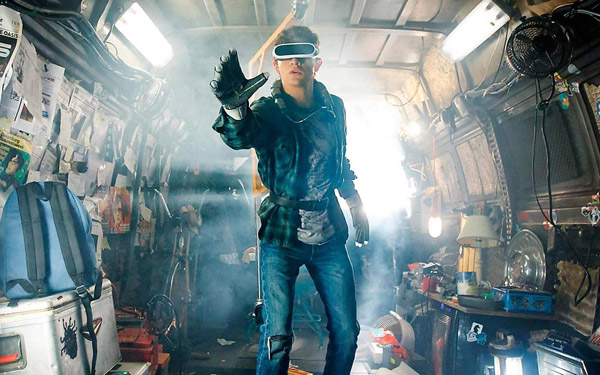
Ready Player One is Steven Spielberg’s 32nd feature film. Based on the novel of the same name by Ernest Cline (who co-wrote the screenplay), the story is an attempt to mine meaning from nostalgia, and to shape that nostalgia into the very thing that it so lovingly looks back upon. The subject of that nostalgia, which was shaped in no small part by the adventure films from the first half of Mr. Spielberg’s career, is pop-culture of the ’70s, ’80s and ’90s. All of it.
Set in 2045, Ready Player One posits a futuristic poorscape where trailers are stacked twenty high, Pizza Hut delivers by drone and Columbus, Ohio, is the fastest growing city in the U.S. People pass their time in an infinite virtual reality playground called the OASIS, invented by an awkward mega-geek from the 20th century named James Halliday. At his death, Halliday started a game for all to play within the OASIS, the winner of which gains sole ownership of the virtual world. Wade Watts (Sheridan), his pal Aech (Lena Waithe), and his crush Art3mis (Cooke) are but a few of the remaining civilians trying to find Halliday’s easter eggs, clues hidden within the dead genius’s archives. While many have moved on from trying to find this “golden ticket” of sorts, the blatantly evil Innovative Online Industries, or IOI, run by the go-to bad guy du jour Ben Mendelsohn (thankfully still relishing his villainous typecasting), uses thousands upon thousands of goons to try to crack the game before Wade and his clan of egg hunters can.
This simple adventure plot of good kids vs. bad guys is told amidst a constant confetti of pop-culture reference points, the conceit being that Halliday peppered these references throughout his game. Like the book, the movie reaches saturation point both in the script and on the screen, but, also like the book, it seldom loses the forest for the trees. While the relentless allusions take up bandwidth that could otherwise be used for character rendering, the adventure that Wade and his avatar Parzival go on is still fun, if predictable. Spielberg is an elder statesman of adventure films, after all, and though he regrettably omitted overt references to his own past projects that heavily influenced this pop-culture Frankenstein’s monster, their inclusion couldn’t have elevated Ready Player One to the classic status that Spielberg’s body of work can claim.













